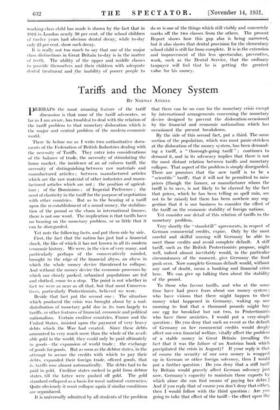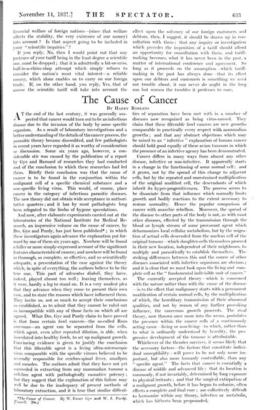Tariffs and the Money System
BY NORMAN ANGELL PERHAPS the most amazing feature of the tariff discussion is that none of the tariff advocates, so far as I am aware, has troubled to deal with the relation of the tariff problem to that monetary dislocation which is the major and central problem of the modern economic xvorld.
There lie before me as I write two authoritative docu- ments of the Federation of British Industries dealing with the necessity of Tariffs. They enter into considerations of the balance of trade, the necessity of stimulating the home market, the incidence of an ad valorem tariff, the necessity of distinguishing between raw materials and • manufactured articles; between manufactured articles which are the raw material of other industries and manu- factured articles which are not ; the position of agricul- ture ; of the Dominions ; of Imperial Preference ; the need of elasticity in the tariff for the purpose of negotiation with other countries. But as to the bearing of a tariff upon the re-establishment of a sound money, the stabiliza- tion of the pound or the chaos in international finance, there is not one word. The implication is that tariffs have no bearing on the monetary problem, or so little that it can be disregarded.
Yet note the following facts, and put them side by side.
First, the fact that the nation has just had a financial shock, the like of which it has not known in all its modern economic history. We were, in the view of very many, and particularly perhaps of the conservatively minded, brought to the edge..of the financial abyss, an abyss in which the whole money device threatened to collapse.
And without the money device the economic processes by which our closely packed, urbanized populations are fed and clothed, come to a stop. The point is not whether in fact we were as near as all that, but that most Conserva- tives, particularly Protectionists, believed we were.
Beside that fact put the second one : The situation which produced the crisis was brought about by a mal- distribution of monetary gold due in its turn largely to tariffs, or other features of financial, economic and political nationalism. Certain creditor countries, France and the United States, insisted upon the payment of very heavy debts which the War had created. Since these debts amounted to very much more than the whole of the avail- able gold in the world, they could only be paid ultimately in goods—the expansion of world trade ; the exchange of goods for-goods. But as soon as the debtor states, in the attempt to secure the credits with which to pay their debts, expanded their foreign trade, offered goods, that is, tariffs rose almost automatically. The debts had to be paid in gold. Creditor states sucked in gold from debtor states, till the latter were pushed off gold. The gold standard collapsed as a basis for most national currencies.- Quite obviously it must collapse again if similar conditions are reproduced.
It is.universally admitted by all students of the problem that there can be no cure for the monetary crisis except by international arrangements concerning the monetary. device designed to prevent the dislocation occasioned by the financial and economic nationalism which has occasioned the present breakdown.
By the Side of this second fact, put a third. The same section of the population, which was most panic-stricken at the dislocation of the money system, has been demand- ing a tariff, a " thorough-going tariff " ; continues to demand it, and in its advocacy implies that there' is not the most distant relation between tariffs and monetary collapse. That aspect of the problem is simply disregarded. There are promises that the new tariff is to be a " scientific " tariff; that it will not be permitted to raise prices (though the farmer, or manufacturer whom the tariff is to save, is not likely to be cheered by the fact that prices, which he has been telling us spell ruin, are not to be raised) but there has been nowhere any sug- gestion that it is our business to consider the effect of the tariff on the economic stability of foreign nations.
Yet consider one detail of this relation of tariffs to the monetary problem.
Very shortly the "standstill" agreements, in respect of German commercial credits, expire: Only by the most careful and skilful nursing will Germany be able to meet those credits and avoid complete default. A stiff tariff, such as the British Protectionists propose, might well, indeed almost inevitably would, in the particular circumstances of the moment, give Germany the final push over. Now complete German default would, without any sort of doubt, mean a banking and financial crisis here. We can give up talking then about the stability of the pound.
To those who favour tariffs, and who at the same time have had grave fears about our money system ; who have visions that there might happen to their money what happened in Germany, waking up one morning to find that a thousand pounds might buy one egg for breakfast but not two, to Protectionists who have these anxieties, I would put a very simple question : Do you deny that such an event as the default of Germany on her commercial credits would deeply affect our own financial welfare, -vitally affect the probleni of a stable money in Great Britain (recalling the fact that it was the failure of an Austrian bank which precipitated the crisis in August)? If your reply is that of course the security of our own money is wrapped up in German or other foreign solvency, then I would put a further question : Do you deny that a stiff tariff by Britain would gravely affect German solvency just now, Germany's capacity to maintain those exports by which alone she can find means of paying her debts And if you reply that of course you don't deny that either, then I would follow with the third question : Are you going to take that effect of the tariff—the effect upon the financial welfare of foreign nations—(since that welfare affects the stability, the very existence of our money) into account ? Is that aspect going to be included in your "scientific inquiries" ?
If you reply, No, then I would point out that any pretence of your tariff being in the least degree a scientific one, must be dropped ; that it is admittedly a hit-or-miss, bull-in-a-china-shop attempt which simply refuses to consider the nation's most vital interest—a reliable money, which alone enables us to carry on our foreign trade. If, on the other hand, you reply, Yes, that of course the scientific tariff will take into account the effect upon the solvency of our foreign customers and debtors, then, I suggest, it should be drawn up in con- sultation with them ; that any inquiry or investigation which precedes the imposition of a tariff should afford an opportunity for consultation with them, and tariff- making becomes, what it has never been in the past, a matter of international conference and agreement. So long as it proceeds on the assumption—which tariff- making in the past has always done—that its effect upon our debtors and customers is something we need not trouble about, it can never do aught in the long run but worsen the troubles it professes to cure.



































 Previous page
Previous page